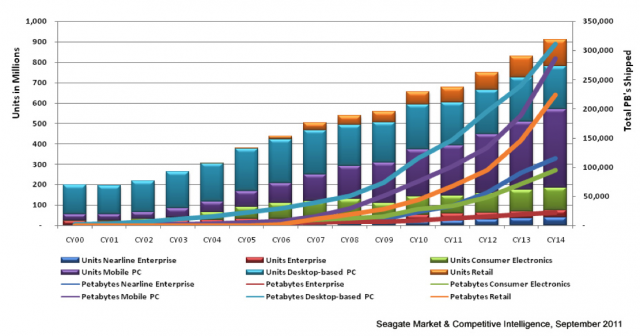The rise of mobile devices (particularly tablets), particularly when combined with Cloud and streaming services, were supposed to be bad for the hard-drive (HDD) business. After all, mobile devices shifted to flash memory for its size, weight, and power consumption advantages (Flash is smaller, lighter, and less of a drain on batteries). Cloud services and widespread broadband access meant that people could store content in the Cloud rather than locally with every access device, reducing the need for add-on HDD media storage. Streaming was supposed to substitute access for ownership, meaning there was no real need to have users store all of the content they were consuming. While these shifts may yet come to fruition, in the short term it seems that demand for storage continues, and hard-disk drives remain the least expensive large capacity storage option.
Three factors should continue to drive demand for HDD drives. First, both streaming and Cloud services require continued expansion of their storage capacity, to handle the increased needs for media content storage on the front end. The growth of mobile and tablets are expected to drive increased demand for media content - and the large data files they require.
Finally, while tablets, Clouds and streaming may well shift consumer attitudes from ownership to access (and reduce perceived need for personal offline storage), that shift will take a while. In the meantime, Clouds are new enough that many users will feel a need for back-up storage locally. In addition, broadband speeds for many aren't sufficient for realtime HD-video streaming, so many consumers prefer streaming to local storage prior to watching. And many of us old folks still believe in "ownership" as a means of assuring access - particularly with the current copyright system built on trying to limit access. As for the potential of tablets as replacements for desktops - demand for local data storage is likely to overwhelm device capacity, meaning that tablet users will need to supplant desktop storage with networked storage. So, even if consumer demand for data storage devices takes a bit of a hit, consumer demand for high-capacity local storage should remain high for some time to come. Even if tablets come to replace desktops.
In the meantime, HDD price per capacity continues to fall, and remains significantly lower than any other data storage option. Until existing (or some new) data storage technology can beat HDD price/capacity levels, the continually expanding demand for data storage should continue to benefit.
Source - It's All About Content: Why Tablets Help Hard Drives, AllThingsD

No comments:
Post a Comment